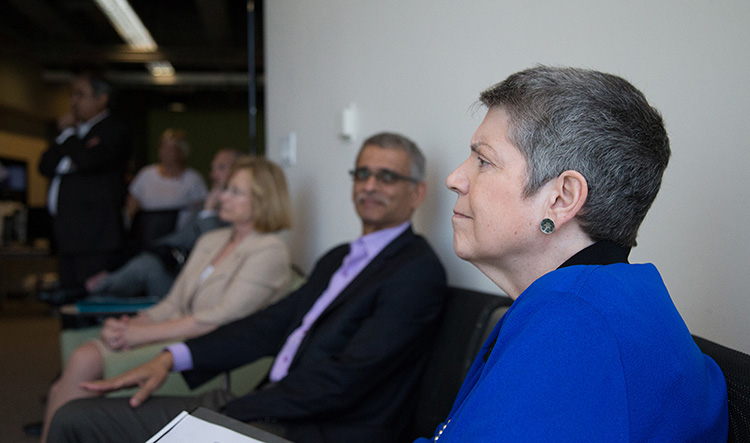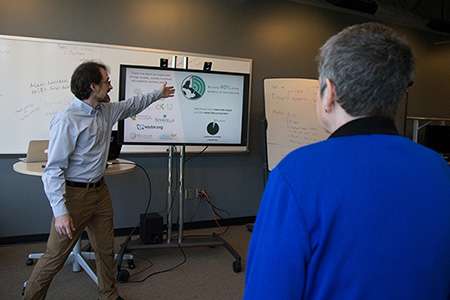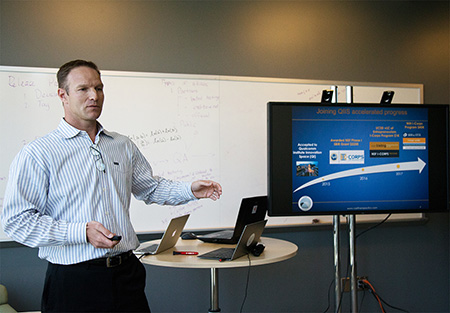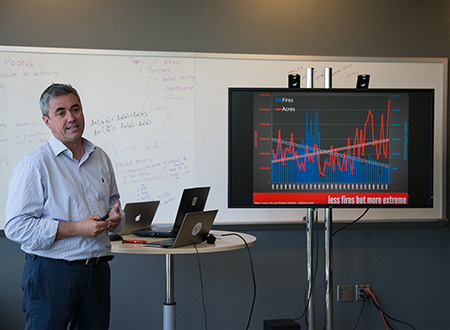
UC President Briefed on UC San Diego, QI Commercialization and Startups
Published Date
By:
- Doug Ramsey
Share This:
Article Content

(r-l) UC President Janet Napolitano, QI Director Ramesh Rao and UC San Diego VC for Research Sandra Brown during Napolitano's April 21 visit to the institute. Photos by Anna Liza Smith/Qualcomm Institute
UC President Janet Napolitano visited the UC San Diego campus on Friday, April 21, for briefings on local activities aimed at commercializing academic research and supporting student entrepreneurship. She also wanted to see first-hand how UC San Diego is taking advantage of state legislation, California Assembly Bill 2664, signed by the governor last September. AB 2664 set aside $22 million to help all 10 UC campuses invest in infrastructure, incubators and entrepreneurship education programs. Each campus received $2.2 million to propel new innovation and startups.
Napolitano’s visit included a visit to the Qualcomm Institute and tour of the QI Innovation Space (QIIS), which did not receive any AB 2664 funding. The facility is located on the second floor of QI’s headquarters building, Atkinson Hall, and QI Director Ramesh Rao introduced Napolitano and VC for Research Sandra Brown to several of the entrepreneurs who lease space in the facility to be near to scientists and engineers in QI or across campus – and to gain access on a paid basis to services available from the institute itself (for communications, design, prototyping, IT services and more).

Cognitive Science alumnus Jaime Alexandre (Ph.D. ’14) explains Learning Equality's nonprofit venture to the UC president during her visit.
QIIS currently has 14 corporate occupants and will shortly announce three new members. Most of the companies have a direct connection to UC San Diego. Cognitive Science alumnus Jamie Alexandre (Ph.D. ’14) is the co-founder of Learning Equality, a nonprofit venture. As Executive Director of the startup, Alexandre is driving a global campaign to bring openly licensed educational materials and blended learning tools to disconnected and low-resource communities around the world in collaboration with several agencies of the United Nations. Learning Equality's open-source tools have already reached over 4 million learners in more than 175 countries and territories, and it recently received a $5 million grant from Google.org’s Global Education Commitment to expand Learning Equality’s Kolibri platform to provide access to a diverse set of learning resources for teachers and students in low-connectivity environments.

QIIS member company CARI Therapeutics CEO Patrik Schmidle briefs Napolitano.
CARI Therapeutics CEO and co-founder Patrik Schmidle briefed Napolitano on his company’s recent awards from NIH and NSF (the latter to perform R&D on a technology platform consisting of a biosensor connected to a mobile app). CARI stands for Clinical Addiction Recovery Institute, and the startup wants to use the widespread availability of smartphones and apps to help treat drug and alcohol addiction. Schmidle told Napolitano that the company entered QIIS because it collaborates closely with UC San Diego experts in addiction research, biosensor engineering and entrepreneurship. “Startup companies face long odds,” Schmidle said recently, “and incubating in an environment like this improves those odds.” CARI’s flagship program integrates cutting-edge smartphone technology with proven behavior-change techniques to address stress management and substance use.

Joaquin Ramirez, CEO of Technosylva, explains the wildfire consulting firm's business niche to UC's president, Janet Napolitano, in QI Innovation Space.
The short presentations ended with Technosylva, one of the original inductees into QIIS when it launched in 2015. CEO Joaquin Ramirez explained to the UC President that the company provides advanced, GIS-enabled software solutions for wildfire protection planning and operational response as well as firefighter and public safety. Originally based in Spain, Ramirez learned of the space from a collaborator, QI geospatial expert Jessica Block, and made the space Technosylva’s R&D office for the U.S. (Ramirez also has a head office in San Diego’s Mission Valley.) In his talk, Ramirez told Napolitano that California is facing a paradox when it comes to fighting wildfires: the number of fires is declining, but they are becoming more and more extreme – making them even harder to fight.
Earlier in the day, Janet Napolitano started her UC San Diego tour in The Basement, a campus facility to help early-stage student and faculty startups with mentoring, workshops and prototyping resources. She was welcomed to the facility with a briefing by UC San Diego Associate Vice Chancellor for Innovation and Commercialization Paul Roben. Subsequent presentations about startups incubated in the facility included current student entrepreneurs Yohann Samarasinghe (RVS Rubber Solutions) and Brandon Magpayo (MyLive), as well as Nanoengineering alumnus Steven McCloskey (B.S. ’15), founder and CEO of Nanome. McCloskey demonstrated the company’s software that integrates a hands-on virtual reality interface with cloud computing and intelligent personal assistance – primarily for R&D use in the life sciences, materials sciences and nanoengineering.
Among the faculty in attendance was Computer Science and Engineering lecturer and alumnus Taner Halicioglu (B.S. ’96), one of Facebook’s earliest employees and a philanthropist, who recently donated $75 million to support a new center for data science at UC San Diego. Halicioglu is also a mentor to startups on campus and off.
Subsequently, Napolitano had lunch with campus leaders including VC for Research Sandra Brown, QI Director Ramesh Rao and others. After lunch, the discussion switched to exploring the benefits of AB 2664. Napolitano met for a roundtable discussion with the deans of the Jacobs School of Engineering, Scripps Institution of Oceanography, Skaggs School of Pharmacy and Pharmaceutical Sciences, Rady School of Management, and the School of Medicine’s Dean of Translational Medicine. AVC Roben also introduced the leaders of Blue LINC, a new healthcare accelerator on campus to speed up the commercialization of life-science discoveries.
Share This:
You May Also Like
Stay in the Know
Keep up with all the latest from UC San Diego. Subscribe to the newsletter today.


